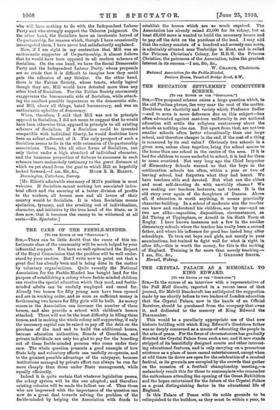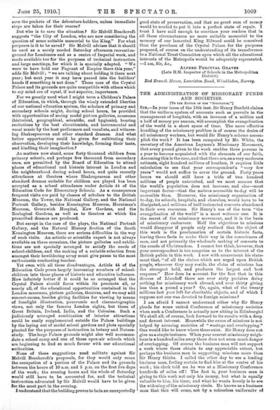THE CRYSTAL PALACE AS A MEMORIAL TO KING EDWARD.
[To THE EDITOR OF TER " SPECTATOR:I Srit,—In the course of an interview with a representative of the Pal/ Man Gazette, reported in a recent issue of that journal, Sir Melvin. Bea,cheroft has anticipated the suggestion made by me shortly before to two leaders of London education that the Crystal Palace, now in the hands of an Official Receiver, should be purchased from the company that owns it, and dedicated to the memory of King Edward the Peacemaker.
This would be a peculiarly appropriate use of that now historic building with which King Edward's illustrious father was so deeply concerned as a means of educating the people in the arts of peace. For the force of circumstances has gradually diverted the Crystal Palace from such a use, and it now stands stripped of its beautifully designed courts and other interest- ing educational features, and is only carrying on a precarious existence as a place of mere casual entertainment, except when at odd times its doors are open for the celebration of a musical festival, or its grounds are occupied by the crowds that gather on the occasion of a football championship meeting,—a melancholy result this for those to contemplate who remember the enthusiasm attending the opening of the Great Exhibition and the hopes entertained for the future of the Crystal Palace as a great distinguishing factor in the educational life of England.
Is this Palace of Peace with its noble grounds to be relinquished to the builders, as they must be within a year, to save the pockets of the debenture-holders, unless immediate steps are taken for their rescue?
But who is to save the situation ? Sir Melvin Beachcroft suggests "the City of London, who are now considering the question of some suitable memorial to the King." For what purposes is it to be saved ? Sir Melvill advises that it should be used as a sorely needed Saturday afternoon recreation- ground for Londoners and as a centre of Imperial work, and made available too for the purposes of technical instruction and large meetings, for which it is specially adapted. " We were to have held our Pageant of Empire there this year," adds Sir Melvill ; " we are talking about holding it there next year; but next year it may have passed into the builders' hands if something is not done." These uses of the Crystal Palace and its grounds are quite compatible with others which to my mind are of equal, if not superior, importance.
For we greatly need what I might term a Children's Palace of Education, in which, through the wisely extended liberties of our national education system, the scholars of primary and secondary schools might, during school hours, be provided with opportunities of seeing model picture galleries, museums (historical, geographical, scientific, and hygienic), hearing recitations by the best elocutionists, and instrumental and vocal music by the best performers and vocalists, and witness- ing Shakespearean and other standard dramas. And what better opportunities could be given for cultivating their observation, developing their knowledge, forming their taste, and kindling their imagination P
As matters now stand, some forty thousand children from primary schools, and perhaps five thousand from secondary ones, are permitted by the Board of Education to attend places of educational and historic interest in London and the neighbourhood during school hours, and quite recently attendance at theatres where Shakespearean and other standard dramas suitable for children are played has been accepted as a school attendance under Article 44 of the Education Code for Elementary Schools. As a consequence frequent visits are paid by classes of scholars to the British Museum, the Tower, the National Gallery, and the National Portrait Gallery, besides Kensington Museum, Horniman's Museum, Greenwich Hospital, Kew Gardens, and the Zoological Gardens, as well as to theatres at which the prescribed dramas are produced.
But except in the case of the plays, the National Portrait Gallery, and the Natural History Section of the South Kensington Museum, there are serious difficulties in the way of such visits. An artistic or scientifie expert is not always available on these occasions, the picture galleries and exhibi- tions are not specially arranged to satisfy the needs of school-children, and the making of a suitable selection from amongst their bewildering array must give pause to the moat enthusiastic conducting teacher.
Yet even with all these disadvantages, Article 44 of the Education Code pours largely increasing numbers of school- children into these places of historic and educative influence. How infinitely better if it could be so arranged that the Crystal Palace should focus within its precincts all, or nearly all, of the educational opportunities contained in the London museums, picture galleries, theatres, and we may add concert-rooms, besides giving facilities for viewing by means of limelight illustration, panoramic and cinematographic views, not only the famous London sights, but those of Great Britain, Ireland, India, and the Colonies. Such a judiciously arranged combination of interior attractions could be easily supplemented outside the Palace buildings by the laying out of model school gardens and plots specially planted for the purposes of instruction in botany and Nature- study. The large Palace grounds might also well accommo- date a school camp and one of those open-air schools which are beginning to find so much favour with our educational authorities.
None of ' these suggestions need militate against Sir Melvill Beachcroft's proposals, for they would only mean the occupation of a portion of the Palace and its grounds between the hours of 10 a.m. and 5 p.m. on the first five days of the week ; the evening hours and the whole of Saturday would still have to be accounted for, and the technical instruction advocated by Sir Melvin would have to be given for the most part in the evening.
I understand that the building proves to be in an unexpectedly good state of preservation, and that no great sum of money would be needed to put it into a perfect state of repair. I trust I have said enough to convince your readers that in all these circumstances no more suitable memorial to the memory of our lamented King Edward could be conceived than the purchase of the Crystal Palace for the purposes proposed, of course on the understanding of its transference to a National Trust Committee upon which all the educational interests of the Metropolis would be adequately represented. —I am, Sir, &c., ALFRED PERCEVAL GRAVES (Late H.M. Inspector of Schools in the Metropolitan District).
Bed Branch House, Laurislon Road, Wimbledon, Surrey.























































 Previous page
Previous page